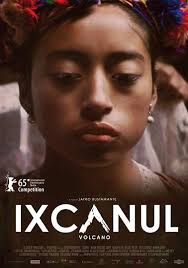
IXCANUL/ IXCANUL VOLCANO
Ixanul/ Volcano is a film of interest because of its portrayal of life in Guatemala and indications of a film industry in that country.
The film could be described as ethnographical, situated in a tribal village, under the shadow of a volcano. The volcano itself is consided having some of the divine, a mother taking her daughter to the volcano to pray and prepare her for a happy marriage. But, the indigenous people have been evangelised centuries earlier so that along with the nature religion, there are elements of Catholicism.
The focus of the family film is the mother and daughter in the family, the mother concerned about their livelihood, the daughter’s marriage, her husband having a job, their dependence on a landowner whom they invite to a meal to discuss a possible marriage. In the meantime, the young girl is attracted by a man of the village who intends to migrate to the United States for a comfortable life. She resists his sexual advances at eventually consents. She had hoped that he would take her away but, of course, he does not and leaves her pregnant.
The mother tries to help her daughter to abort the child but then accepts the reality, with the father in fear of losing his job from the landowner who will despise his daughter. She is beaten by a snake and taken to hospital, gives birth, but is told that the child is dead, and the family is given a coffin which is buried. The daughter feels that the child is still alive, digs up the coffin, finds a brick enclosed – the landowner had got his revenge on the girl by selling her baby.
In its 90 minutes, the film takes on a great number of themes. There is a sympathetic picture of the village, indigenous people speaking their own language, many not understanding Spanish, relying on translators who are not always honest (as in the taking of the census as well as the lies of the landowner).
This is an ethnological film taking audiences deeper into Guatemala and its variety of cultures.
1. The title, physical, psychological, religious, for the people? Activity on the volcano?
2. Guatemala, local cultures, Hispanic cultures, the blend? Issues of languages, customs, the city and country? Religion, Christianity, animist religions? The opening prayer – and it’s not being answered?
3. The local people, the past, language, farms, the pigs in the mating (and success), home, meals, parties and drinking, work in the fields, the role of the spiritual guide, crops and snakes, pregnancy, abortion, hospitalisation?
4. The dominant mother, her husband and his work, their plans, the widower and his family, Maria and the marriage? Maria and her attitude, pregnancy, her mother helping her for an abortion? Clearing the snakes, Maria being bitten, in hospital, the mother and her strong presence?
5. Maria, her age, the initial prayer, working with the pigs, work on the farm? Her relationship with Pepe, the caress and her resistance? His drinking, the party, giving in to him? Her wanting to leave with him? His saying the first time would not produce pregnancy? Her becoming pregnant, the response of her mother, coping, the jumping for the abortion? The snakes, the bite, Hospital? The delivery of the baby? Signing the document? The difficulties with translations? The later revelations about the baby, her grief, the funeral, digging up the coffin and finding a brick?
6. The father, work on the farm, dependence on Ignacio, the meal with the family, depending for his job, going searching for jobs?
7. Ignacio, nice, widower, his parents, the dinner, wanting to marry Maria? The news about the baby, his false translations at the hospital, signing the baby away? Concerned about Maria’s fertility?
8. Pepe, getting away, his description of the American dream?
9. The census people, the difficulties with language, the different translations?
10. The return to the hospital, unaware of what had happened about the baby, the pleas of the mother, Ignacio and his translations, the deception? The mother still pleading?
11. A film about two coexisting cultures in Latin America?